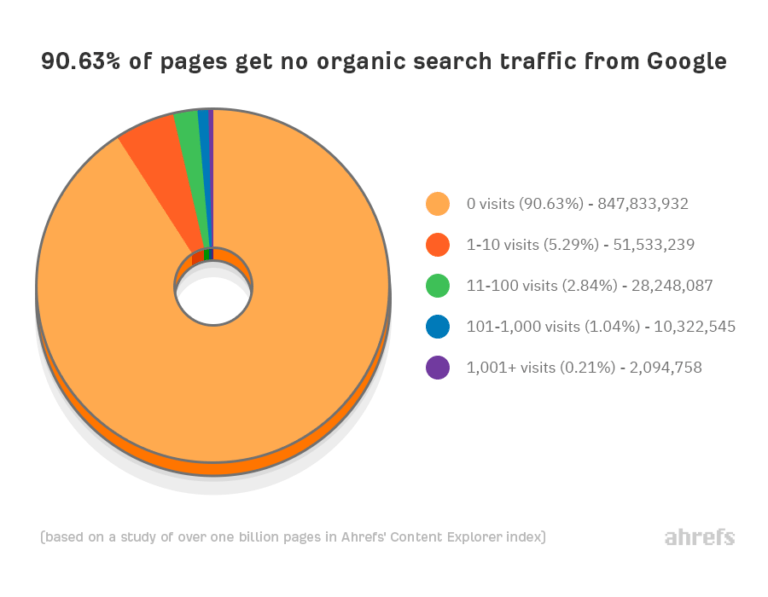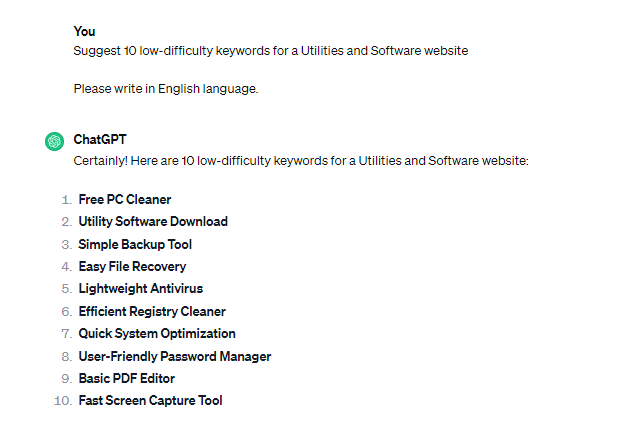How to do Keyword Research to Drive Traffic and Search Visibility?

This post is also available in:
Search engine optimization (SEO) relies on several factors, and the chief among them is keyword research.
It’s not difficult to see why that is.
No matter how excellent or informative your website content is, it won’t get any traffic from Google and other search engines unless people search it.
Statistics from Ahrefs say over 90% of online pages are not generating traffic from Google.
Keyword research tells you what people are interested in. Finding the keywords your target audience wants to read about positions you for search traffic, puts you among the top-ranking pages, and helps to keep things organized, among many other benefits.
The good news is that keyword research is not as complex as it seems. Below, we’ll reveal everything you need to know on how to do keyword research, the importance, and helpful tools to make the process seamless.
But first, let’s find out what keyword research is.
What is Keyword Research?
Keyword research is an important part of search engine optimization, which involves exploring, analyzing, and identifying search terms, such as words, phrases, and queries, that users enter into search engines when looking for information.
Researching keywords makes it possible to get a sneak peek into your audience’s minds. Not only does it reveal what your audience wants, but it also tells you the reason they want it.
A typical keyword research will present a host of other information like the average search volume of any keyword, popularity, difficulty, how much advertisers spend on it, and the top beneficiaries of traffic from the keyword.
Why Website Owners Need Keyword Research
Finding the right keywords and effectively applying them can make a world of difference for websites. Below are some essential benefits of conducting keyword research:
- Growing Visibility and Organic Traffic
When people explore information online, they input keywords. It is the job of website owners to create content around these keywords so users can find them when they search. By performing keyword research, you can attract more organic traffic to your website when search engine users find your posts.
- Attracting Your Target Audience and Customers
Through keyword research, you can get an idea of what your readers are interested in and the types of content that will draw in customers for your business. Keyword research will reveal search intent, which will, in turn, help to answer questions people are asking.
- Guiding Your Marketing and Content Strategy
You need keyword research to uncover the best keywords to target as well as the insights surrounding them. This will form a crucial foundation for your content strategy, whether it is required for marketing or just search engine optimization.
The different levels of keywords you discover may also be useful for organizing content on your website.
- Helping Search Engines Understand Your Website
Working with the right keywords is also beneficial for helping search engines understand the content and structure of your website. This is because they tell search engines what your website is about, and they can suggest your website when relevant queries are entered.
Connecting Website Themes and Keywords
While keywords are a huge part of what makes a website tick, there has to be a working relationship with the website’s overall theme. Each website must belong to a niche, which is what informs the keywords. However, generating niche-related keywords is not the end of the journey because they cannot be dropped randomly on website pages.
Instead, keywords must be intentional, specific, and appear within content that reflects the website’s niche, theme, and message.
Aligning keywords with the website theme will promote a clear structure and coherent message. It is also beneficial for retaining visitors since they’ll get a positive user experience and contribute to helping search engines establish your website as an authority in your niche.
Finally, connecting keywords to website themes makes it easy to evolve your strategy and adapt to newer trends. Without this, your website may struggle to hold its own in any niche, limiting visibility and traffic.
How to do Keyword Research From Scratch
Although keyword research has challenges, it is easily achievable when you know the steps to follow. This section will guide you through the essential steps to kickstart your keyword research journey:
#1. Identify Your Target Audience
Identifying your target audience before going all in on keyword research is crucial. This will be useful in the remaining parts of the keyword research process. Check who they are, what they do, their interests, etc.
For instance, a health and fitness website could target individuals that are seeking workout routines with keywords like “simple workout routines” or “exercise for beginners.” A travel blog may likely tailor its content to people looking for budget-friendly vacations using a keyword like “affordable family vacations.”
Getting the audience identification out of the way helps to ensure streamlined keyword research, which will yield relevant keywords faster. Ignoring this step will not only lead to wasted time and efforts, but also affect the impact of research on your SEO strategies.
#2. List Out Relevant Seed Keywords
Seed keywords are broad and highly competitive keywords that will serve as the foundation for your keyword research journey. A seed keyword can be your niche or highly related keywords that define it.
Think of seed keywords as the main categories under your main niche. This is also usually where keyword research tools begin before fleshing out. For example, someone who operates a media-related website could come up with seed keywords like:
- Entertainment
- News
- Media coverage
- Journalism
- Pop culture
- Media industry
For someone with a travel website, their seed keywords can look like this:
- Travel destinations
- Vacation planning
- Travel tips
- Backpacking
- Food and travel
- Travel photography
Bear in mind that these may not necessarily be keywords you should target. They mostly serve as a starting point and should not take too long to figure out.
#3. Expand Each Broad Topic Keyword
You can generate specific keywords to target on search engine result pages (SERPs) from the seed keywords you’ve identified in the previous step. Remember that keywords are entered into search engines, and the keywords you come up with should reflect this.
For example, elaborating the second list above could give you something like:
- Exotic travel destinations
- Top tourist spots
- Vacation packing guide
- Travel organization tips
- Kid-friendly travel activities
- [Location] travel guide
- Luxury hotel reviews
- Photography gear for travel
- Must-have travel items
- Top foodie destinations
You can just insert each of your seed keywords into keyword research tools, like Google Keyword Planner, Ahrefs, Semrush, etc., to generate the keywords. The keywords from this step can still be explored for even more ideas.
#4. Explore Related Keywords
Exploring related keywords presents more viable ideas that you can work with. Thanks to latent semantic indexing (LSI), Google and other search engines treat conceptually related concepts similarly, even when the terms differ.
When you pop keywords into SEO tools, check the “related keywords” tab for more ideas. You can also discover related keywords using Google search by scrolling to the bottom of the search page.

Each keyword under the related searches presents more ways to generate even more.
#5. Check Current Sources of Traffic
If your website has been up for a while, there’s a good chance it is already generating traffic from certain keywords. You can learn about this and build on the keywords and their related terms.
To do that, you’ll need software like Google Analytics, Google Search Console, Semrush, Moz Pro, or HubSpot.
This is also helpful to find out if your website has the impact you want or if it’s passing the right message to the right audience. If this results in keywords you’re not interested in, that is a sign you should write more content on relevant keywords.
#6. Analyze Competitors
Another excellent idea is to look at the keywords that generate traffic for your direct competitors. This is a faster method, but it requires that you recognize your competitors. One way to find competitors is to enter your keywords into Google and check which websites rank high on the SERPs.
When you find direct competitors that are doing well, input them into an SEO tool to see their top pages and keywords. Repeat this process with multiple websites to discover interesting keywords you could target on your website.
#7. Study Niche Trends
By now, you should have enough keywords to work with, and we’ll help you determine which to choose in the next section. If you need more keywords or want to vary things slightly, we recommend researching current trends in your niche.
You can achieve this by following industry news and social media trends. It will reveal hot topics that you can create content around for traffic opportunities. An example is the recent ChatGPT frenzy. Websites that have content around the topic in the early days may stand a better chance of getting more traffic from related queries.
How to Estimate Keyword Efficiency
After compiling a list of potential keywords, assessing their efficiency is essential to determine which keywords to target or prioritize. Here are the parameters for estimating keyword effectiveness:
Search Volume
Search volume is the average number of times a specific keyword is searched within a period. It is usually measured per month, which is why the unit is MSV (monthly search volume).
More popular keywords have higher search volumes, indicating a higher chance of being discovered but also more competitiveness. Therefore, you need to strike the right balance between popularity and other factors.
Other things you should know about the search volume are that it is country-specific, is an annual average, and does not reflect how many page visits your website will get from it.
Potential Traffic
When checking the effectiveness of a keyword, it is crucial to evaluate the potential traffic the keyword will generate if the post ranks well on Google. Potential traffic considers factors that could impact the keyword, such as its relationship with other keywords. Keyword research tools like Ahrefs will give you the estimated traffic potential for any keyword you research.
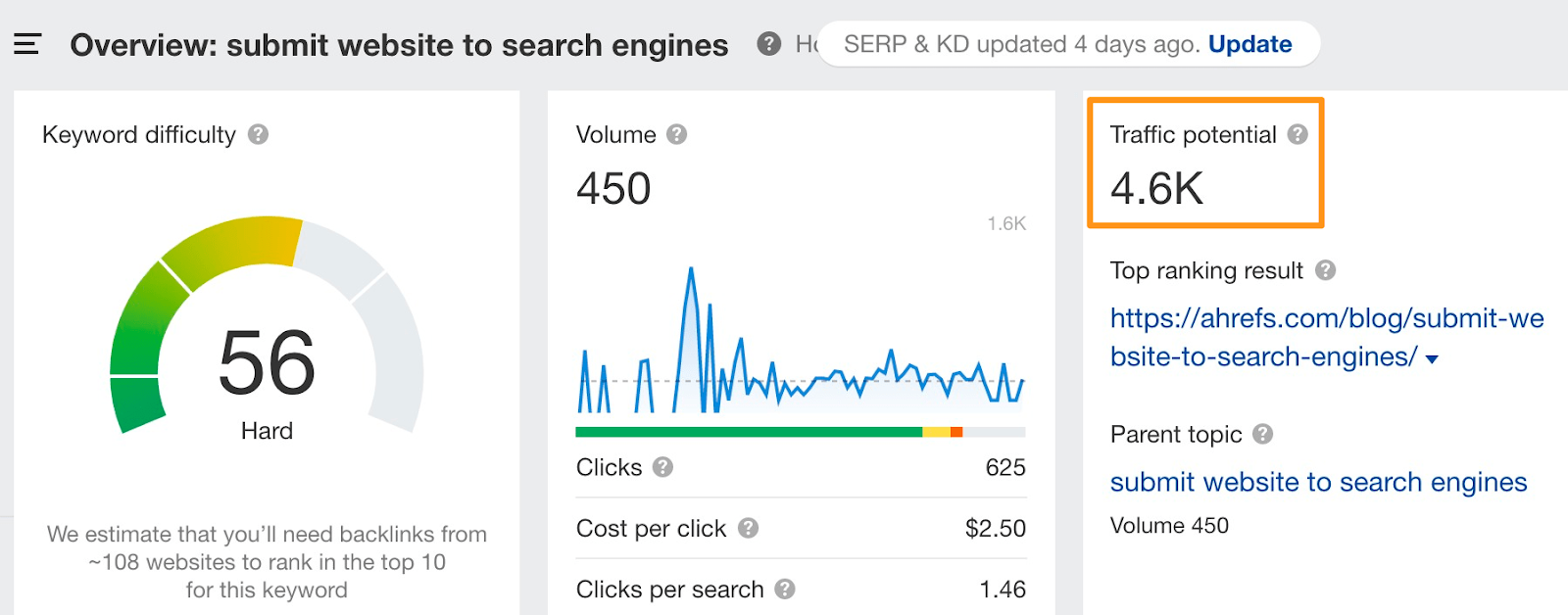
Keyword Difficulty
The keyword difficulty measures the ease of ranking for a specific keyword based on competitiveness. The more competitive keywords will naturally have a higher difficulty level, but they also yield more traffic, especially if you’re able to rank high.
For newer websites, focusing more on low and medium-difficulty keywords may be easier. As time passes, you can vary things up, depending on the keyword opportunities you find.
Search Intent
Search intent refers to the reason users are searching a keyword, and it is essential that you consider this and tailor your content towards it. The benefit is you’ll provide user solutions and prove relevance to search engines.
While people use search engines for various purposes, their intent can be classified as one of five – informational, navigational, transactional, commercial, or local query.
Let’s take a look at an example related to sports. Say, SERPs show:
- Scores and live updates for a recent football match.
- Information about a sports documentary released in 2021.
- People Also Ask (PAAs) about both the game and the documentary.
This diverse set of results might leave publishers scratching their heads. However, within the same search query, there could be two distinct intentions at play.
Search engines can’t discern the exact intent of the user, so they present a mix of results. If you’re aiming to rank in such a scenario, what’s the optimal strategy?
The key is to align your content with the specific search intent you’re targeting. While you can’t control the mixed results, you can tailor your page to cater to the audience you want to attract.
For instance, if your website primarily focuses on sports news and live updates, optimize your content to satisfy the informational intent of users seeking the latest scores. Users looking for sports documentaries are unlikely to engage with your site, even if it ranks higher for that particular query.
- Informational search intent is at the top of the funnel, and it refers to when users are looking for an answer or specific information. Examples are “How old is Joe Biden?” and “What is the standard size of a football pitch?”
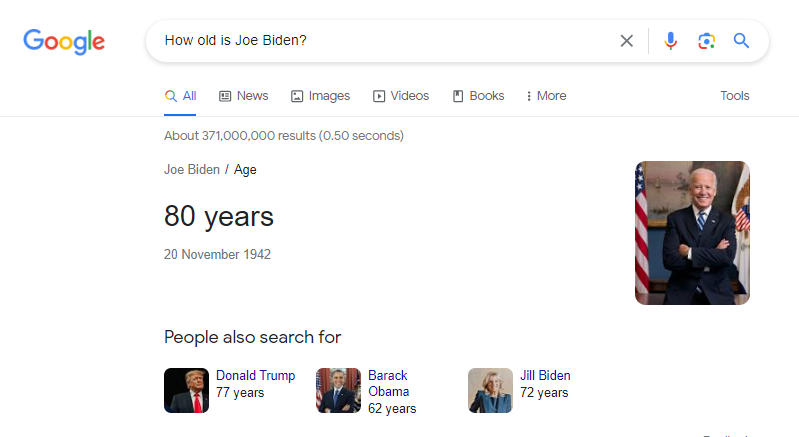
- Navigational search intent is when a user searches for something specific, like a particular brand or website. An example is “the official website of the University of Chicago.”
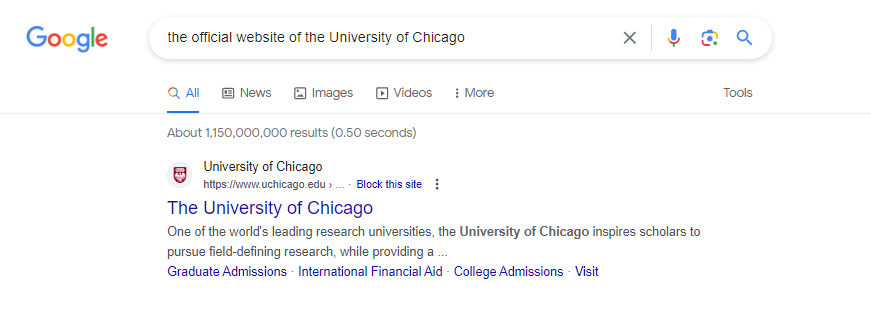
- Commercial search intent is a middle-of-the-funnel search, which involves users in search of brands or businesses for the purpose of comparing them to find out the best. An example is “best video games for adults.”
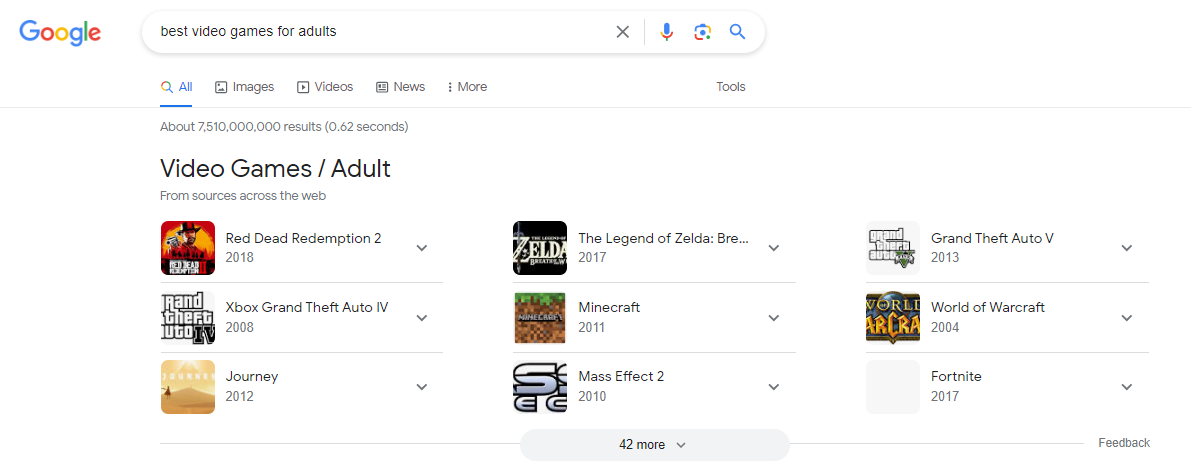
- Transactional search intent is at the bottom of the funnel. It means a user is ready to act or make a purchase. For instance, a “buy iPhone 15 Pro Max” search indicates a user is ready to buy a phone.
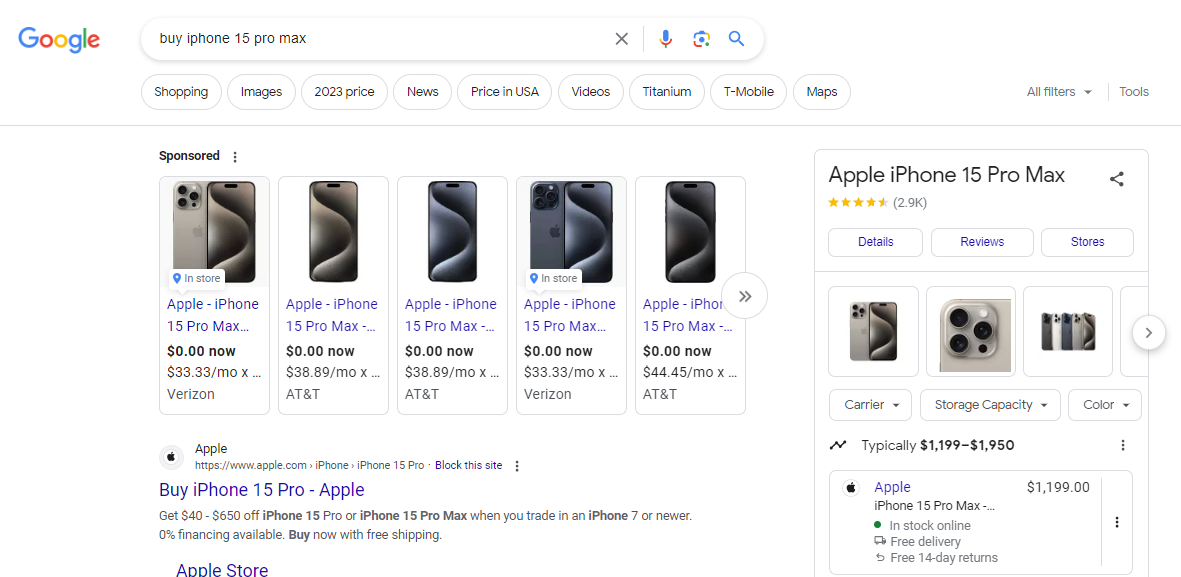
- Local queries refer to searches that involve a specific location, such as “eateries in Houston, Texas.”
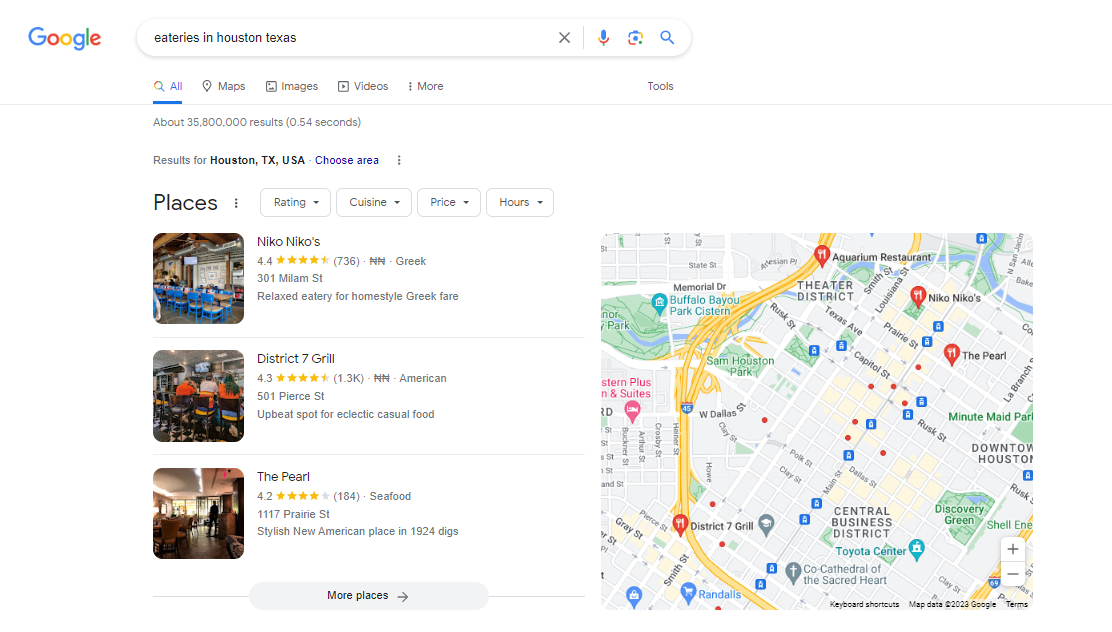
Cost Per Click (CPC)
Cost per click is the amount advertisers are ready to pay per click on an ad related to a specific keyword. This term is used in paid advertising, but it gives an idea of how much commercial value a keyword has. The higher the CPC of a keyword, the greater the importance attached to such a keyword.
Keywords with a transactional search intent tend to have a higher CPC than informational keywords. The former usually leads to a purchase, and advertisers are willing to spend more to put themselves at the forefront of such keywords. You should also note that CPC values are less stable and can change quickly compared to search volume.
Keyword Research Tips and Best Practices
As you already know, keyword research is an intricate task with many parts you need to take care of. Consider the tips and best practices below to streamline the process and maximize effectiveness:
- Leverage Long-Tail Keywords
Long-tail keywords are longer and highly specific keywords used for online searches. They have a low search volume and are often overlooked. However, their unique user intent coupled with low competition means they are the perfect low-hanging fruits you need to generate traffic.
- Avoid Keyword Stuffing
Getting as many keywords in as possible can be tempting, but be careful not to fall into keyword stuffing. This is an excessive use of keywords to influence search engine ranking. It is a harmful practice that can affect the readability of your content and incur penalties from search engines.
You can find out if you’ve overused keywords by reading the content and checking the natural flow and readability or calculating the keyword density. The keyword density is the percentage of the occurrence of a keyword in relation to the total number of words.
Many tools like SurferSEO, SEO Review Tools, Yoast SEO, Hemingway Editor, etc. can give you an ideal number of times each keyword should appear and whether you’re using any one too many times.
- Don’t Ignore What Already Works
Before working with any keyword, look at the search engine results pages to see what already ranks. This is good for recognizing search intent and gives you a good idea of how to proceed and create higher-quality content.
- Focus on Providing Quality
The main aim of any website owner should be to provide quality content that solves user queries. Give as much information as possible, write in ways that users can understand easily, and insert keywords naturally. As more people find your content helpful, your pages will get traffic, move up the rankings, and Google algorithms will consider your website as reliable.
- Monitor Performance and Adjust Regularly
Keyword research is not a one-time task. You have to check the performance and adjust keywords from time to time. As you discover keywords moving up the rankings, you can update the content with more information or create supporting pages with related keywords.
- Stay Updated with Trends and Algorithm Changes
Google rolls out adjustments to their search algorithms. Monitor how they affect your pages and find ways to consolidate your positions. Also, follow industry news to find out about updates and new opportunities.
Make your monetization process efficient and highly strategic with Monetag. Monetag is a cutting-edge monetization platform that offers diverse ad formats, advanced tools, and earnings from multiple traffic sources.
Ready to maximize the revenue potential of your online presence? Join Monetag today and experience the next level of monetization.
Final Thoughts
Now that you know how to do keyword research, remember that it requires continuous attention to unlock more opportunities for your website.
We hope with the steps outlined above and the extra tips and tools mentioned, you can navigate the complexities and grow your website through keyword research.
In addition to algorithmic changes from search engines, industry trends can also evolve quickly, and only with keyword research can you better equip yourself to act quickly and accordingly.
Monitor the keywords you choose regularly, as this will reveal more keywords and suggest ways to refine existing ones. Leverage keyword research and other SEO tools, look out for more opportunities, remain proactive, create user-centric content, and you’re on your way to achieving continuous website growth.
Cheers!
